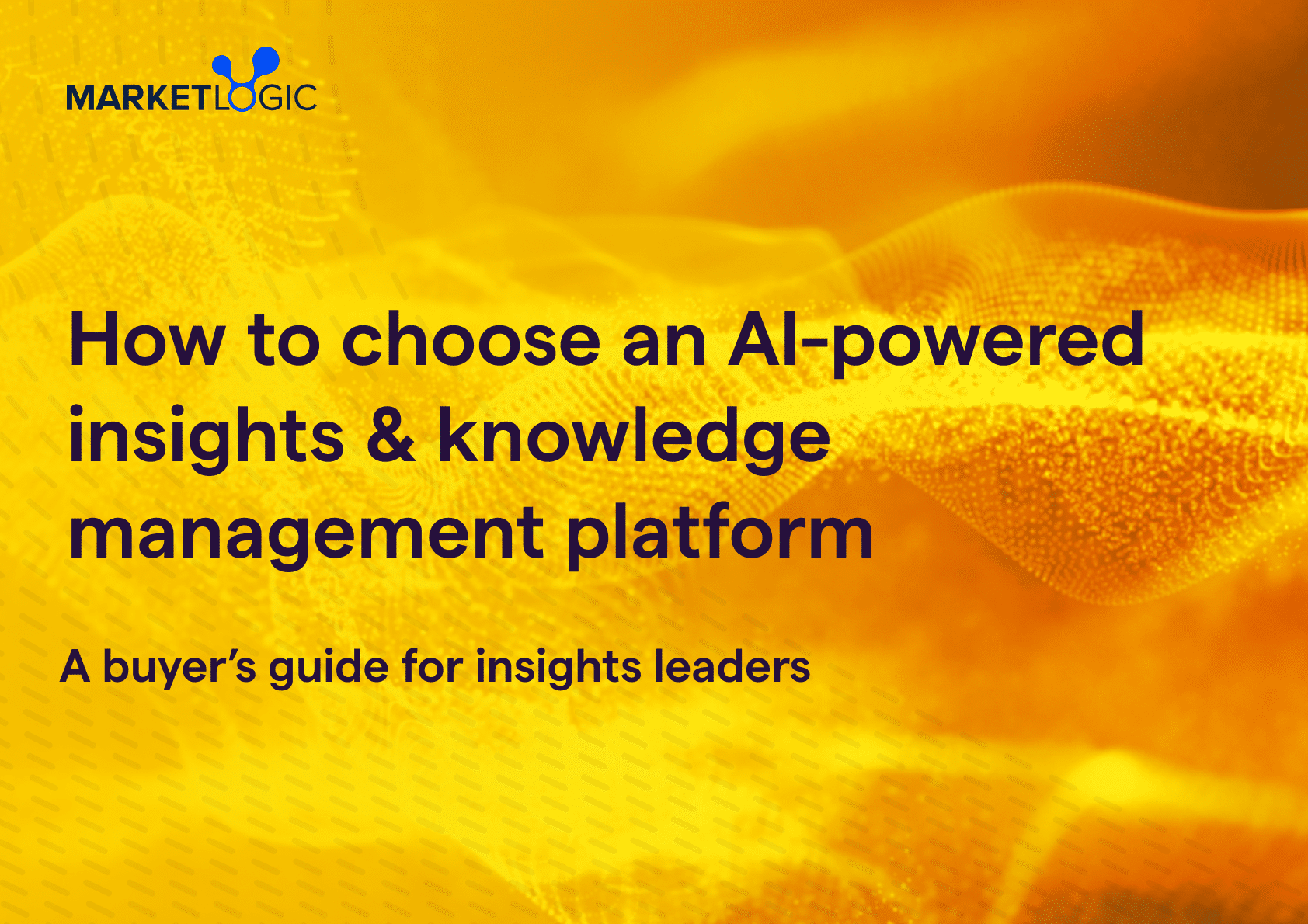AI is rapidly transforming how enterprises manage knowledge, from powering smarter search experiences to automatically generating insights from vast document libraries. Gen AI technologies like Retrieval-Augmented Generation (RAG) are making it easier than ever to surface relevant, context-aware information on demand. But with this power comes new challenges.
As AI systems become embedded in knowledge management platforms, organizations face heightened risks around data privacy, security, transparency, and trust. Poorly governed data can lead to misleading outputs, regulatory violations, or exposure of sensitive information — eroding confidence in the very systems designed to help.
In this post, we explore how strategic data governance in AI knowledge management can help your organization ensure secure, trustworthy, and high-performing AI-powered insights, so you can unlock the full value of your customer and market knowledge. By embedding data governance frameworks into your AI knowledge management environment such as DeepSights WorkSpace, you can create a system that’s not only smarter, but also safer, more transparent, and compliant at every stage.

Data governance challenges in AI-powered knowledge management
As organizations embed AI into knowledge systems, strong data governance becomes critical — and complex. Here are some key data governance challenges organization’s face.
Security risks
AI systems integrated into knowledge management platforms often access large volumes of enterprise data — some of which may be confidential, proprietary, or personally identifiable. Without the right safeguards, sensitive information can be unintentionally exposed through AI-generated outputs or improperly stored training data. A single breach or privacy violation can have regulatory and reputational consequences.
Data privacy and compliance
Laws like GDPR, CCPA, and sector-specific regulations impose strict rules on how data is collected, used, and retained — especially when AI is involved. If AI models are trained on data without proper controls, organizations risk falling out of compliance. Worse, the “black box” nature of many AI systems makes it difficult to audit how data is being used or to respond to data subject access requests.
Lack of transparency
Users interacting with AI in knowledge systems often don’t know how an answer was generated, which sources were used, or how current the information is. This lack of traceability creates uncertainty and weakens business user confidence, which can be detrimental in enterprises where decisions rely on trusted, verifiable knowledge.
Output quality
Even advanced AI models can produce inaccurate, misleading, or biased outputs. In a knowledge management context, this can mean surfacing outdated or incorrect information or reinforcing systemic biases, which can harm productivity and decision-making.
Given these risks, how can your organization ensure that your AI-enhanced knowledge management systems are secure, compliant, accurate, and trustworthy?
The answer lies in strategic data governance complemented by the right AI-driven knowledge management solution for IT leaders. By applying effective data governance principles alongside your AI knowledge management system, your organization can manage risk, protect data, and deliver AI outputs the business can trust.

Data governance for AI-driven knowledge management
To maintain trust in AI-powered knowledge management systems, enterprises must implement thoughtful, end-to-end data governance frameworks with clear and robust data security, transparency, and privacy policies and protocols. They must also continuously monitor AI applications and refine their governance structures as both their technology and workflows evolve.
This isn’t just about meeting compliance requirements — it’s also about using data governance best practices to ensure the knowledge surfaced by AI is accurate, secure, and contextually appropriate for your business. That way, your teams can take advantage of the game-changing power of AI and make confident, informed decisions — without second-guessing the reliability of AI-driven customer and market insights.
Top three components to consider in your AI data governance policies
Start with the foundation: Effective data governance helps establish and enforce data and AI standards from the outset. Clearly define data governance policies that address AI input data quality standards, how data and knowledge is created, stored, accessed, and deleted, and AI output quality standards. Consider resources like ISO/IEC 38505 and the European Commission’s High-Level Expert Group on AI to help structure your governance approach while also adapting these to the nuances of internal knowledge workflows and your choice of AI technology.
Below, we outline three key components every organization should consider as they develop and refine their data governance policies for AI-enhanced knowledge management.
1. Data quality assurance for AI knowledge management
You’ve probably heard the phrase “garbage in, garbage out” — and when it comes to AI, it couldn’t be more accurate. If your AI is drawing from outdated, poor quality, or unverified content or training datasets, the answers it generates will reflect that. That’s why strong data governance is the backbone of any effective AI knowledge management system.
You don’t want your AI scraping the open web for customer and market information. Instead, your AI should pull from your organization’s most trusted, high-quality sources — like proprietary market research, licensed content, and subscription feeds. Robust data governance ensures AI and data integrations — such as an API — are secure, seamless, and selective.
It’s not just about clean data going in — it’s also about building a feedback loop. AI systems should continuously learn from user input to get smarter and more accurate over time. That kind of iterative improvement only works if your governance framework supports it.
This is also where your choice of RAG tools becomes critical. Your AI knowledge solution should do more than connect to trusted sources — it should stay grounded in them. That means responses that are precise, traceable, and backed by real citations your stakeholders can trust.
What makes a good AI for insights solution? When comparing different solutions for AI-powered insights, generic AI tools often miss the mark when it comes to nuance. In market and consumer intelligence, small context shifts can mean big differences in meaning. Without tailored governance, your AI might deliver insights that are misaligned, outdated, or flat-out wrong — putting your credibility and decision-making at risk.
A strong AI data governance framework should also “supercharge” your market insights, empowering your system to recognize and flag data limitations — like conflicting sources or outdated info — before they lead to errors. That’s the kind of smart, context-aware AI organizations need to drive better insights with confidence.
2. Data security and compliance for AI knowledge management
Your data governance framework should place security and compliance front and center, embedding best practices that safeguard sensitive information and build trust across the organization. This includes clearly defined policies for both internal operations and external AI service providers.
Start with implementing enterprise-grade access control to protect data integrity and confidentiality. Strong governance means using robust, auditable systems that enforce granular access privileges — ensuring only authorized users can access specific data and AI capabilities.
Media sanitization and destruction is also important. Both your organization and any AI vendors should have clear, enforceable procedures for securely handling storage media. That includes sanitizing, destroying, and disposing of hard drives, USBs, and other devices to prevent data leaks or unauthorized access to sensitive information.

Just as critical is transparency around how your data is used during the AI training process. Your governance policies should ensure that data is never used to train AI models without explicit, documented permission. This protects your proprietary knowledge and ensures that your AI knowledge management solution is serving your organization — not someone else’s future model development.
Of course, no governance framework is complete without ongoing compliance with data protection regulations like GDPR. That means consistently handling personal and proprietary data according to standardized protocols — whether it’s being stored, processed, or surfaced through AI-generated outputs.
Routine system checks and audits are a must. Your organization and your AI solution providers should conduct regular security assessments, software updates, and audits to ensure continued compliance and to identify and fix vulnerabilities before they become a problem.
Additionally, data masking and encryption are essential data governance tools that help prevent sensitive information from being inadvertently exposed through AI outputs — especially if the AI has been trained on enterprise data.
Governance isn’t just a set of documents or guidelines — it’s about operationalizing trust. Build specialized AI risk management processes into your operations. That includes evaluating and mitigating risks throughout the AI lifecycle, from development to deployment, and conducting routine audits of model outputs and data flows to ensure they remain aligned with your enterprise values.
3. Responsible AI for knowledge management
When insights professionals and business users rely on AI to surface insights, answer questions, or guide decisions, they need to trust not only the data, but also the system that delivers it. That trust can only be built through a data governance framework that prioritizes transparency, consistency, and human oversight.
Consider the reliability and consistency of AI outputs. Responsible AI means ensuring that the answers generated by your system are accurate, based on approved content, and consistent across repeated queries. In knowledge-heavy domains like research and insights, inconsistent outputs from the same dataset can erode confidence and compromise decision-making. Strong data governance helps maintain quality by ensuring AI draws only from trusted sources and applies consistent logic to its responses.
Bias assessments and model integrity checks are essential, too. AI systems can inadvertently reflect or amplify harmful biases, especially when trained on flawed or unbalanced datasets. A responsible AI approach includes routine evaluations to detect and mitigate bias, as well as safeguards against adversarial inputs that could manipulate the system. These controls should be built directly into your AI operations — and governed by policy.

One of the most important pillars of responsible AI is transparency. Users should be able to trace an AI-generated answer back to its original sources. RAG systems should offer clear source attribution. That level of traceability builds confidence and helps ensure outputs stand up to scrutiny internally and externally. Data governance plays a crucial role here, by enforcing rules around source credibility, documentation standards, and metadata tagging.
Finally, human oversight is non-negotiable. Even the best AI models aren’t perfect, and insights and IT leaders must remain diligent. Responsible AI means giving users the tools to flag poor outputs, suggest corrections, and contribute to a feedback loop that continuously improves the system.
When AI is treated as a collaborator rather than an oracle — and when strong governance ensures its outputs are trustworthy, traceable, and aligned with enterprise standards — organizations can confidently unlock the full value of AI-powered knowledge management.
What good data governance looks like in practice for AI-powered knowledge management
While data governance can often feel abstract, platforms like DeepSights show how strong governance practices can be built into the very fabric of an AI-powered knowledge management system — making governance not just a requirement, but a competitive advantage.
Security-first infrastructure is a foundational principle. DeepSights encrypts data both in transit and at rest, including during backups, to safeguard confidentiality and integrity. Controls for information classification determine the sensitivity of resources, ensuring only authorized users can view or interact with specific knowledge assets. Access control is granular and role-based, with administrative permissions and audit trails that provide full visibility and traceability.
Governance extends to AI outputs, too. Every response generated by DeepSights includes clear source attribution. This ensures users can verify the origin, context, and relevance of insights, a vital feature for responsible AI. To prevent misuse or unintended outputs, DeepSights applies rigorous input validation and sanitization, ensuring that no harmful or malicious inputs can compromise the integrity of the AI system. The platform also maintains clear documentation of its algorithms and assumptions, which supports explainability and bias review — two critical elements of responsible AI governance.
Deepsights is intentionally designed to prioritize accuracy before breadth, focusing on delivering reliable results — outputs your teams can trust — instead of too many inconsistent functions. It’s a governance-informed approach that emphasizes precision, consistency, and explainability.
DeepSights also features built-in feedback loops that allow users to flag and improve AI responses. This feedback is anonymized and used to retrain models, enhancing accuracy over time while preserving data privacy. It’s a clear example of governed, human-in-the-loop learning in action.
To ensure compliance and operational trust, DeepSights aligns with ISO 27001, conducts third-party penetration testing, and enables organizations to generate auditable logs for internal and regulatory reviews. Data is never used for AI training without explicit permission, and models are trained only on clean, verified datasets — with safeguards in place to prevent bias or manipulation. DeepSights data storage, data backup, and disaster recovery solutions are compliant with GDPR regulations and the EU AI Act.
Finally, human oversight is a guiding principle. DeepSights positions AI as a powerful assistant — not a replacement for human judgment. With transparent operations, routine audits, and ethical AI practices built in, DeepSights turns data governance into a strategic advantage.
Strengthen your AI data governance strategies with DeepSights
As enterprises embrace AI to enhance their knowledge management systems, the importance of data governance becomes crystal clear. Without the right guardrails, AI can introduce new risks — from exposing sensitive information to generating misleading or biased outputs. But with a thoughtful, well-executed governance strategy, AI can become a powerful, trusted ally in helping teams discover insights, make decisions, and work more efficiently.
Ready to see how DeepSights can elevate your AI-powered knowledge management?
DeepSights can help you fortify your AI governance strategies by embedding governance directly into your AI workflows, ensuring that every step of your knowledge management process is aligned with best practices for quality assurance, security, compliance, and responsible AI.
Request a free trial today and discover how DeepSights can help you turn AI into your most reliable business partner.








